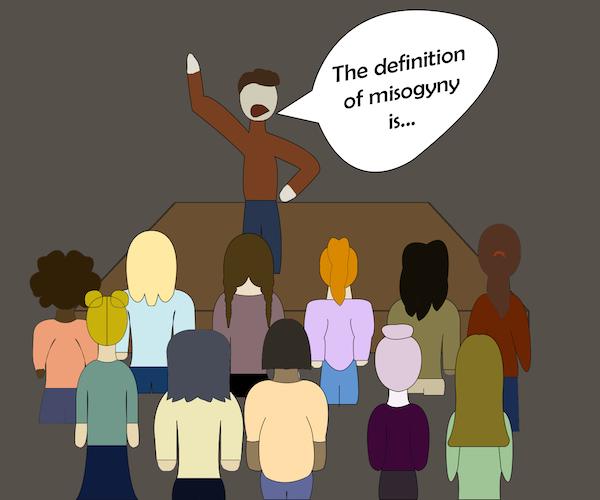To whom it may concern,
While it is the 21st century and many assume misogyny and gender inequality occur on a less frequent basis among our generation, that assumption is quite frankly wrong. Women on and off campus, in the U.S. and in countries all over the world, continue to face sexism in their everyday lives.
What sparked this public service announcement? A boy on my floor began mansplaining — the act of explaining a subject to a woman arrogantly as if they are clueless by a man — to the girls on my floor about different subjects: psychology to a girl planning to minor in the subject, Chicago to a girl from Illinois and the word “bimbo” to us all. This was not a one-time occurrence. Since our first week at MU, he has continuously mansplained sports, school and math, even. We all agreed we had had enough; we had to confront him.
After conveying our feelings to him, he apologized. However, after explaining that he had not meant to be sexist, he continued explaining what misogyny is to me and my friend. I was appalled. How could a man not know he was blatantly mansplaining to the women around him? Then, it hit me.
Some — not all — men are simply unaware of some of the sexist actions they commit against the women around them. It’s a sad reality, but that’s why I decided to write this. This is dedicated to all the girls who have to experience disrespect every day. To the men reading this article, good job at making the first step to not irritate the women around you.
The first question you should ask yourself should always be, “Did they ask me to explain this topic?” If the answer is “No,” then you are probably mansplaining.
If they did not ask and you continue to talk about the subject, ask yourself these follow-up questions:
First, does the woman you are talking to have a background in the field? Does she know more than you? Second, would most women in this field know about this topic? Is it common knowledge?
If any of the answers to these questions are “Yes,” then you are possibly mansplaining. A good rule of thumb would be to try not to explain anything if you are unsure about her credentials in the field, or if she simply did not ask for you to say anything more. Usually, the “saying anything more” is where you go wrong.
However, if you possibly know more than she does in the field and she explicitly asks you to go into more depth, then you are not mansplaining.
This is really just the harsh reality most women face on a day-to-day basis. In a meta-analysis of 43 gender studies, researchers Kristin J. Anderson and Campbell Leaper found that men are more likely than women to interrupt others during conversations, especially when such conversation regards a more “masculine” subject, such as task oriented activities.
As an example, at the first football game of the season, I sat next to a boy I know and told him I do not know many of the play-by-play rules of football. After the first touchdown, he proceeded to explain to me what a touchdown is and what it means in a very condescending way. Now, I do not know a lot about football, but a touchdown is common knowledge to anyone who follows sports; my family loves football, and I played softball my entire life. In other words, I would definitely know what a touchdown is, and he knew that.
While it may have been sarcastic and he did apologize soon after realizing what he said, the example still stands.
To some, those sorts of interactions may seem harmless — something women just need to learn to move on from or let roll off their shoulders. But when it’s your reality every day, and when you know women across the world have dealt with it for centuries, it’s unbearable.
The worst part of it all is that when we speak out about it all, we are seen as radical feminists with anti-men agendas or overly emotional women with hormonal issues.
Women are stuck in a horrible paradox of unjust treatment and being too scared or cynical to speak out about it.
Please, think about the way you treat the women around you. All we want is to be treated as equals.
Sincerely,
Abby Ramirez
Equality Now is an organization striving to end gender inequality through a series of campaigns, legal advocacy, partnership building and community mobilization that encourage governments to enact or enforce legislation that not only protects, but uplifts women and girls. Their main goals are to achieve legal equality, and end sexual violence, sex trafficking and other harmful practices.
https://www.equalitynow.org/donate
Edited by Cayli Yanagida | [email protected]














